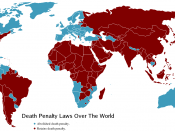Death penalty has been a controversial issue over the recent centuries in human societies. Opponents believe it is inhumane, barbaric, uncivilized and immoral. Nevertheless, advocators are on the conviction that capital punishment brings justice, safety and security. In the article I chose to read concerning the issue, Peter Mikelic directly attacks death penalty and by appealing to logic and emotion in his thesis statement he argues that ÃÂThe punitive taking of life in a democratic, moral and free country still cannot alter past bloodshed, much less impede the reduction of future homicidesÃÂ (Mikelic). he asserts that the enforcement of capital punishment does not protect the innocent and cannot provide a ÃÂpotent deterrentÃÂ. However, I totally disagree with his idea and believe that although execution does not compensate the loss, it ceases the sense of vengeance and certainly functions as a warning lesson in public psychology and values human life in todayÃÂs societies.
Moreover, it saves the innocentsÃÂ lives and deters the would-be murderers by the horrible fear it unconsciously creates in them.
The majority of people who live in a democratic society value human life and believe in a justice system that punishes murderers in order to serve justice for all and consequently demand safety. If human life is valued in such a society, individuals have to be made certain that there exists an appropriate and strict punishment for the smallest threat to their lives. How would people in a society treasure human life if they felt one who has taken a life were still alive without a severe punishment? As Jorg Mardian quotes Edward Koch in his article Why We Need Death Penalty: Because it Works ÃÂIt is by exacting the highest penalty for the taking of human life that we affirm the highest value of human lifeÃÂ (Mardian).


